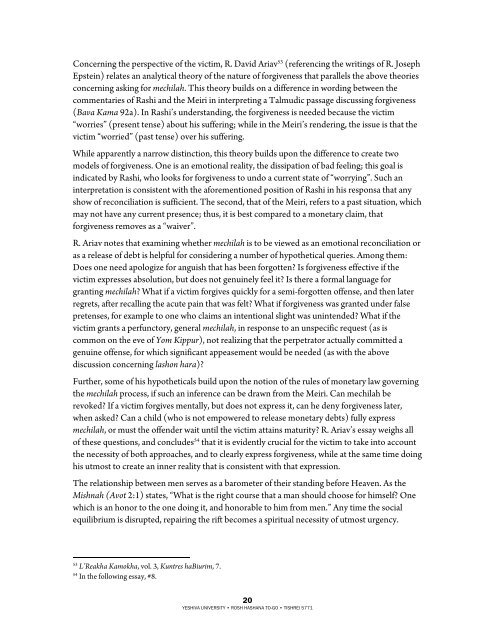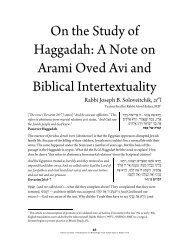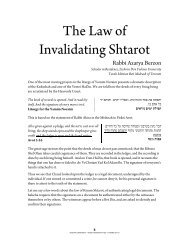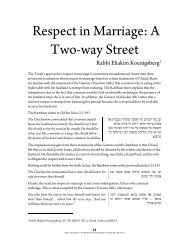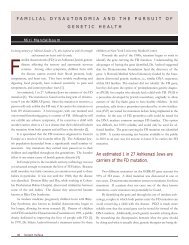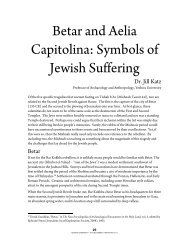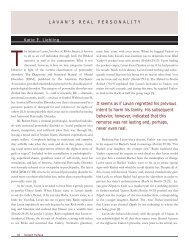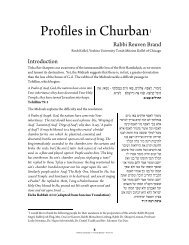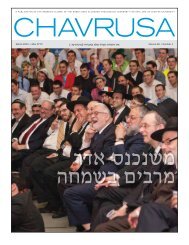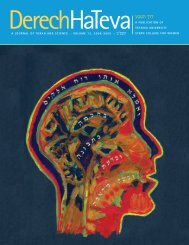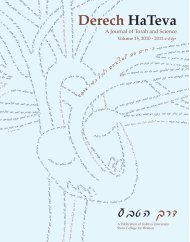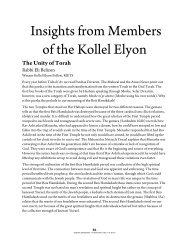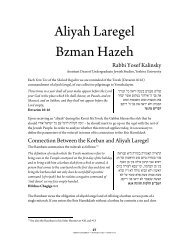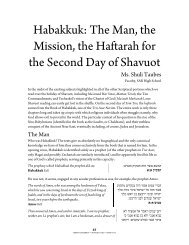YESHIVA UNIVERSITY • ROSH HASHANA TO-GO ... - YUTorah.org
YESHIVA UNIVERSITY • ROSH HASHANA TO-GO ... - YUTorah.org
YESHIVA UNIVERSITY • ROSH HASHANA TO-GO ... - YUTorah.org
Create successful ePaper yourself
Turn your PDF publications into a flip-book with our unique Google optimized e-Paper software.
Concerning the perspective of the victim, R. David Ariav 53 (referencing the writings of R. Joseph<br />
Epstein) relates an analytical theory of the nature of f<strong>org</strong>iveness that parallels the above theories<br />
concerning asking for mechilah. This theory builds on a difference in wording between the<br />
commentaries of Rashi and the Meiri in interpreting a Talmudic passage discussing f<strong>org</strong>iveness<br />
(Bava Kama 92a). In Rashi’s understanding, the f<strong>org</strong>iveness is needed because the victim<br />
“worries” (present tense) about his suffering; while in the Meiri’s rendering, the issue is that the<br />
victim “worried” (past tense) over his suffering.<br />
While apparently a narrow distinction, this theory builds upon the difference to create two<br />
models of f<strong>org</strong>iveness. One is an emotional reality, the dissipation of bad feeling; this goal is<br />
indicated by Rashi, who looks for f<strong>org</strong>iveness to undo a current state of “worrying”. Such an<br />
interpretation is consistent with the aforementioned position of Rashi in his responsa that any<br />
show of reconciliation is sufficient. The second, that of the Meiri, refers to a past situation, which<br />
may not have any current presence; thus, it is best compared to a monetary claim, that<br />
f<strong>org</strong>iveness removes as a “waiver”.<br />
R. Ariav notes that examining whether mechilah is to be viewed as an emotional reconciliation or<br />
as a release of debt is helpful for considering a number of hypothetical queries. Among them:<br />
Does one need apologize for anguish that has been f<strong>org</strong>otten? Is f<strong>org</strong>iveness effective if the<br />
victim expresses absolution, but does not genuinely feel it? Is there a formal language for<br />
granting mechilah? What if a victim f<strong>org</strong>ives quickly for a semi-f<strong>org</strong>otten offense, and then later<br />
regrets, after recalling the acute pain that was felt? What if f<strong>org</strong>iveness was granted under false<br />
pretenses, for example to one who claims an intentional slight was unintended? What if the<br />
victim grants a perfunctory, general mechilah, in response to an unspecific request (as is<br />
common on the eve of Yom Kippur), not realizing that the perpetrator actually committed a<br />
genuine offense, for which significant appeasement would be needed (as with the above<br />
discussion concerning lashon hara)?<br />
Further, some of his hypotheticals build upon the notion of the rules of monetary law governing<br />
the mechilah process, if such an inference can be drawn from the Meiri. Can mechilah be<br />
revoked? If a victim f<strong>org</strong>ives mentally, but does not express it, can he deny f<strong>org</strong>iveness later,<br />
when asked? Can a child (who is not empowered to release monetary debts) fully express<br />
mechilah, or must the offender wait until the victim attains maturity? R. Ariav’s essay weighs all<br />
of these questions, and concludes 54 that it is evidently crucial for the victim to take into account<br />
the necessity of both approaches, and to clearly express f<strong>org</strong>iveness, while at the same time doing<br />
his utmost to create an inner reality that is consistent with that expression.<br />
The relationship between men serves as a barometer of their standing before Heaven. As the<br />
Mishnah (Avot 2:1) states, “What is the right course that a man should choose for himself? One<br />
which is an honor to the one doing it, and honorable to him from men.” Any time the social<br />
equilibrium is disrupted, repairing the rift becomes a spiritual necessity of utmost urgency.<br />
53 L’Reakha Kamokha, vol. 3, Kuntres haBiurim, 7.<br />
54 In the following essay, #8.<br />
20<br />
<strong>YESHIVA</strong> <strong>UNIVERSITY</strong> <strong>•</strong> <strong>ROSH</strong> <strong>HASHANA</strong> <strong>TO</strong>-<strong>GO</strong> <strong>•</strong> TISHREI 5771


